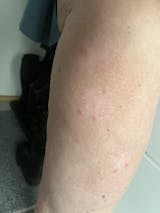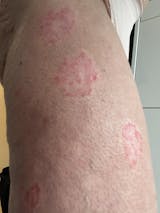Purple arrow
Willow extract has been used for natural cosmetics many years back. Experience from this long tradition means that it is safe to use willow for cosmetics. The purple willow has the highest content of salicylic acid and ascorbic acid that we find in nature, and it is the most used ingredient in anti-aging skin care products. Ascorbic acid is used in high percentages in creams for skin cancer and sun damage. Ascorbin and salicylic acid together are used against pigment damage and not least for hormonally disturbed skin, as they inhibit the bad bacteria and keep lactic acid bacteria alive longer. Ascorbic acid is also a vitamin C that is important for the body's immune system. Among other things, it protects against viruses and bacteria in the skin.
Salt curd
Residue is the water that is left when table salt has been produced at Læsø Saltsyderi. This brine is not edible, but it does contain a number of minerals and trace elements which have proven to be extremely beneficial for the skin. Salt contains trace elements, magnesium, minerals and iodine, which are absorbed directly by the skin. The residual layer has, perhaps somewhat surprisingly, a composition that is very similar to human blood plasma. This is one of the reasons why it has such a beneficial effect on our skin. Even bad eczema and psoriasis can be alleviated. Milder cases of skin problems such as pimples, inflammation and fungus can be markedly improved or even disappear. The salt concentration in our brine is 9 times higher than that of ordinary seawater, and the brine therefore contains the same concentration as is found in the Dead Sea in Israel.
The interaction in Anti Irritation
Salt and willow solution is targeted for irritated, problematic skin and for relief from, among other things, eczema and the like. For dry, scaly and very irritated skin, it softens the scaly and dry flakes. At the same time, it relieves itching and is wound-healing. All minerals work together to improve metabolic processes, thereby ensuring that the skin's normal functions are maintained and that it maintains its healthy, shiny appearance. Irritations and bacteria both from the inside and outside are combated, so that only the skin's protective bacterial flora is retained. The need for ascorbic acid, usually called vitamin C, is increased by physical stress, hormonal imbalance, pollution, disease, tobacco smoking etc. Together with iron, vitamin C is necessary for the formation of the 20 amino acids that the body uses to build protein and collagen. Lack of collagen means that the smallest blood vessels become brittle, the skin becomes thinner, fragile and wounds heal poorly. Minerals and vitamins penetrate the skin and contribute to the normalization of collagen production. In addition, it contributes to protecting the cells against oxidative stress - for example, the influence of the sun's UV rays, hormonal disturbances, eczema, bacterial attacks etc.











